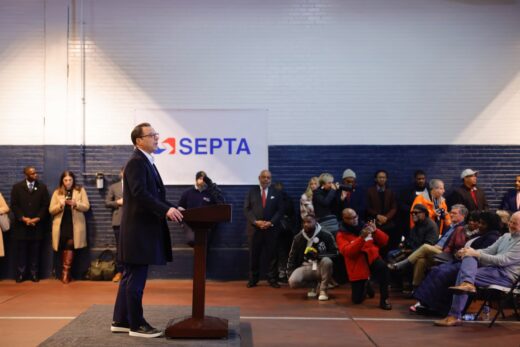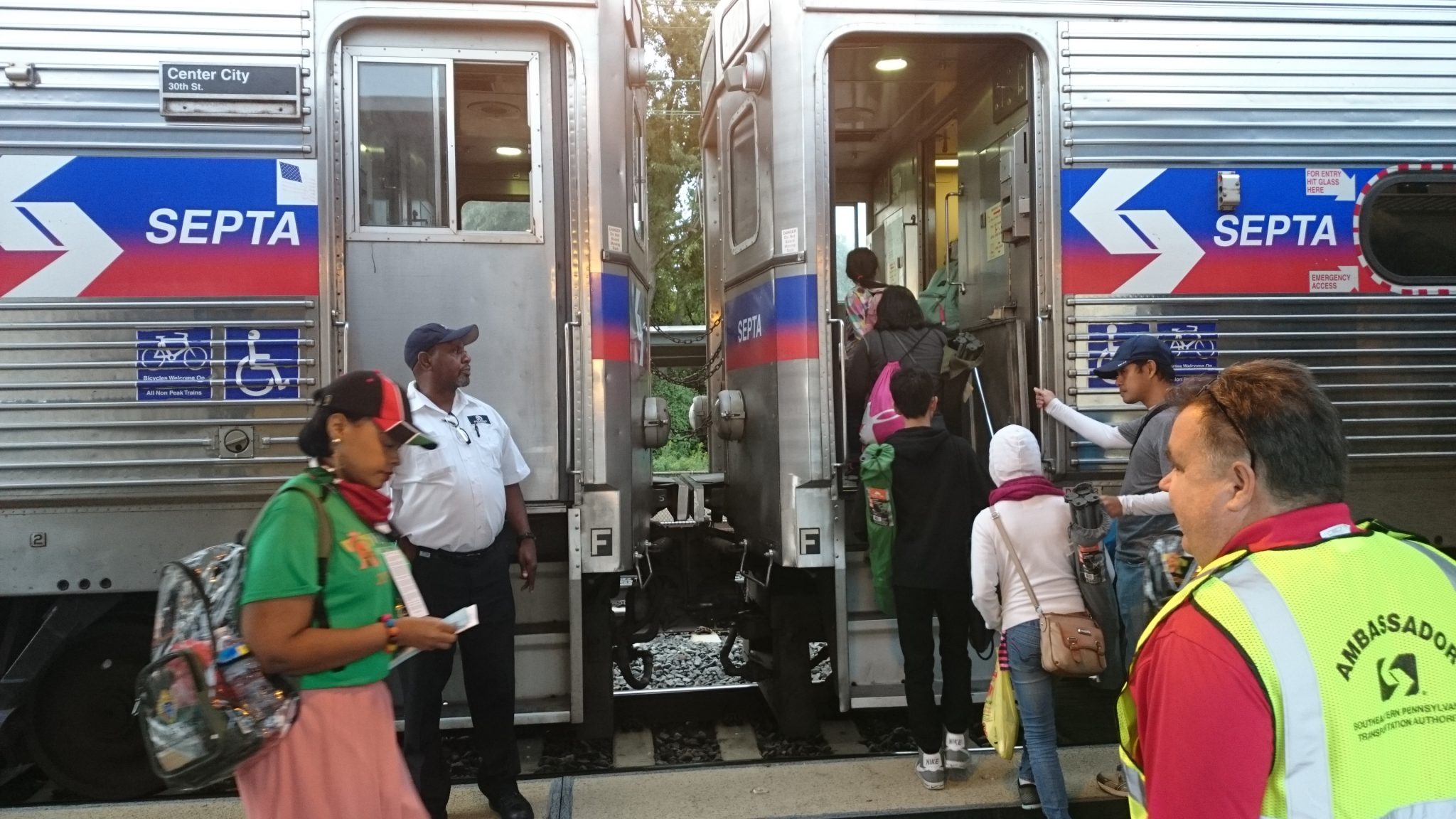Spotlight PA is an independent, nonpartisan, and nonprofit newsroom producing investigative and public-service journalism that holds power to account and drives positive change in Pennsylvania. Sign up for our free newsletters.
By Stephen Caruso | Spotlight PA

Gov. Josh Shapiro will route $153 million in federal highway funding to SEPTA to help the struggling transit agency avoid — at least temporarily — deep service cuts and hefty fare hikes.
“Just like we prepare and maintain our roads and bridges in those rural and in those suburban communities, I think we owe it to the good people of Pennsylvania who take mass transit to be there for them and their families as well,” Shapiro said Friday in Philadelphia, flanked by buses flashing a thank you message to him.
SEPTA said Shapiro’s announcement allows it to avoid a 30% fare hike planned for Jan. 1. However, the Philadelphia-area agency will follow through on a plan to eliminate a discount for riders who use the system’s Key card to ride buses, trolleys, and subways. The Dec. 1 change amounts to a 50-cent increase for transit riders and higher fares for commuter rail users.
Routing highway dollars to SEPTA is a temporary solution that won’t be enough to close the agency’s $240 million deficit. Board Chair Ken Lawrence warned of more service cuts that would begin on July 1, 2025, unless SEPTA secures more funding.
“Governor Shapiro has thrown us a lifeline,” Lawrence said.
That timeline neatly overlaps with the state’s budget deadline of June 30. Legislators typically remain in Harrisburg for most of the month to build a spending plan. Shapiro will open negotiations with his budget address in February.
Pennsylvania currently provides almost $2 billion to 50-plus public transit agencies across the commonwealth. SEPTA is a prime beneficiary: It received $757 million in state sales tax money in 2023 to cover operating costs like salaries.
Still, facing high inflation, reduced ridership because of remote work, and the end of federal pandemic aid, the agency has said it needs more funding to be sustainable and complete some planned service revisions.
Transit advocates say future cuts could cause the agency to enter free fall, as worse service begets reduced ridership, leading to further financial troubles.
Heading up to the El platform at the Frankford Transportation Center on Friday, commuter Eric Rivera said he was unaware of the potential fare hikes. He figured he could afford it, but worried about others.
“Even people who are smart with their money,” Rivera said, might have to take multiple buses to work; the cost of those transfers could quickly compound if ticket prices go up.
Shapiro’s temporary funding solution takes advantage of funds that come primarily from the federal gas tax. They numbered almost $2 billion in the 2022-23 fiscal year, and the 2021 federal Bipartisan Infrastructure Law boosted them even higher.
This isn’t the first time a Democratic governor has used executive power to sidestep the legislative process on transit funding. General Assembly Republicans have chafed at the practice in the past, arguing that flexing highway dollars pits rural drivers against urban transit riders.
Legislative Republicans renewed such arguments Friday. In a statement, lawmakers including state Senate Majority Leader Joe Pittman (R., Indiana) said Shapiro had “chosen to politicize and pillage critical infrastructure projects for other districts which are well outside of SEPTA reach.”
As part of his 2024 budget proposal, Shapiro pitched routing $1.5 billion in new state aid to public transit over the next five years. Republican leaders said they could only get on board if there was a stable revenue source. Their preference: regulating and taxing skill games, slot machine-like terminals that have proliferated in taverns, convenience stores, and social clubs.
State House Democrats secured a one-time boost of $80.5 million for transit as part of the budget while hoping for a fall deal. In the end, internal GOP disagreements sunk such an agreement, though lawmakers have indicated the issue will be back on the table in the new year.
“We are going to spend the next six months in the most serious way possible to get this over the line,” state House Majority Leader Matt Bradford (D., Montgomery) said, adding that a successful effort must combine support from organized labor and big business. “We are not going to let party politics or region stand in the way.”
Any deal requires Republican backing. And with the state staring down a structural deficit that could use up its surplus by 2026, getting GOP support may require Democrats to back off other policy goals.
In a statement Friday, state Senate President Pro Tempore Kim Ward (R., Westmoreland) called SEPTA’s funding woes “a crisis of [Shapiro’s] own making.” She argued that Democrats should have prioritized more money for transportation rather than public education during this year’s budget process.
“The bottom line is this: Pennsylvanians — especially those in the southeast — are losing out, not because of divided government, but because Pennsylvania Democrats have chosen to focus their priorities and spending on one area alone,” Ward said.
The General Assembly will swear in its new members on Jan. 7. Democrats will control the state House 102-101, while Republicans will have a 28-22 majority in the state Senate.
The reallocated federal highway dollars were previously earmarked for seven interstate highway projects, according to Shapiro. He added Friday that none had been put out to bid and are “a long way off.”
“Hear me on this: There is no reason to keep that money on our balance sheet in the state when we can invest it in SEPTA right now and help this community,” Shapiro said.
He said the highway projects, which affect areas including Jefferson, Philadelphia, and York counties, would not be delayed.
Additionally, Shapiro said he had “challenged” the five counties served by SEPTA to step up their funding for the agency. They will provide the agency with almost $23 million in new funding in 2025, Lawrence said. Most of it will come from Philadelphia.
BEFORE YOU GO… If you learned something from this article, pay it forward and contribute to Spotlight PA at spotlightpa.org/donate. Spotlight PA is funded by foundations and readers like you who are committed to accountability journalism that gets results.
Advertisement

Convenient Legal Access to High Quality Cannabis Just A Few Minutes Away!









